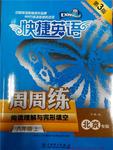题目内容
It’s summer movie time again. Check out our list of four films.
Harry Potter and the Prisoner of Azkaban
Release Date: November 4
Story: It’s the summer before Harry Potter’s third year at Hogwarts School of Witchcraft and Wizardry. A dangerous murderer, Sirius Black, has escaped from the Wizards’ Prison. And he was ordered to kill Harry Potter.
Around the World in 80 Days
Release Date: November 16
Story: This version of the classic novel set in 1872 focuses on Passepartout ( Hong Kong actor Jackie Chan), a Chinese thief who seeks refuge (庇护) with a strange London adventurer, Phileas Fogg. Passepartout uses his martial art skills(军事技能) to defend Fogg from danger as he travels around the world in 80 days.
Spider-Man 2
Release Date: November 30
Story: Peter Parker is still coming to accept his dual identity (双重身份) as the crime superhero Spider-Man. He wants to reveal his secret identity to Mary Jane, meanwhile, his Aunt May is in trouble. This is Dr Otto Octavius who has appeared to bring her a lot of troubles.
King Arthur
Release Date: November 7
Story: King Arthur is presented as a clever ruler who manages to unite all the knights in Britain. Under the guidance of Merlin and the beautiful, brave Guinevere, Arthur will struggle to realize his dreams.
1.When can you see the film acted by Jackie Chan?
A. November 4 B. November 30
C. November 16. D. November 7.
2.In Spider-Man 2, Aunt May’s trouble is caused by______.
A. Spider-Man B. Peter Parker
C. Mary Jane D. Dr Otto Octavius
3.What kind of article of this passage?
A. A news report B. A funny diary.
C. An advertisement. D. A composition.
 快捷英语周周练系列答案
快捷英语周周练系列答案
